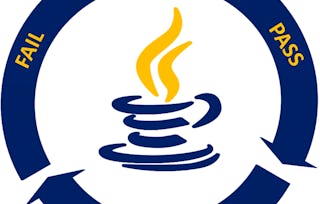Updated in May 2025.
This course now features Coursera Coach! A smarter way to learn with interactive, real-time conversations that help you test your knowledge, challenge assumptions, and deepen your understanding as you progress through the course. Are you looking for a simple guide to learning unit testing? This video course is perfect for you. It includes hands-on exercises and best practices to help you understand JUnit and Mockito unit testing with ease. -The course starts with an introduction to unit testing and the importance of JUnit. -You'll create a Java project using JUnit and follow best practices for writing and running unit tests with JUnit and IntelliJ IDEA. -You'll also write mock object-based unit tests with Mockito and make powerful assertions using the Hamcrest assertions library included with JUnit. -By the end, you'll have the skills to write better unit tests using JUnit, Mockito, and Hamcrest. This course is suitable for Java developers and testers with basic Java knowledge who want to write unit tests using JUnit, Mockito, and Hamcrest. Learn modern unit testing concepts, run tests in the IDE, analyze code for quality tests, and compose readable assertions.















